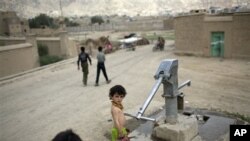Today, more than 800 million people do not have clean water and even more lack basic sanitation, causing the deaths of more than 1.5 million children each year. And by the year 2025, nearly two-thirds of the world’s population will be living under water-stressed conditions, causing an increase in hunger, disease and strife.
The United States is committed to reducing water-related diseases and to increasing access to safe drinking water and sanitation in countries with critical needs. One of the most effective ways to improve access to clean water and sanitation is to work in partnership with developing country governments, private businesses and civil societies. So, U.S. aid experts work closely with experts and leaders in host countries to design and implement programs that best fit local needs.
In 2009, the U.S. invested 774 million $ in the international water sector. Of that amount, 514 million $ went directly for drinking water, sanitation and hygiene. Above the 744 million, the U.S. Government funded 41 million $ in water sector aid through our support to 10 UN development and environment organizations, and was the single largest bilateral donor to multiple international humanitarian organizations. In addition, the U.S. government also made financial contributions to seven multilateral development banks which obligated 9.2 billion $ for water related projects in 2009.
Among the 62 developing countries receiving U.S. assistance in 2009, the Democratic Republic of the Congo was able to reach rural populations with its Healthy Village and School Strategy; Mozambique is building a new dam; Iraq completed 113 water distribution and treatment projects; and Gaza and the West Bank got new, expanded and rehabilitated water networks and sewage systems. Given the huge scale of the global water challenge, the U.S. is also leveraging additional private and public resources for clean water and hygiene programs by partnering with local private sector companies, charitable organizations, community-led groups, and global corporations.
As Secretary of State Hillary Clinton said on World Water Day last March, "It’s not every day you find an issue where effective diplomacy and development will allow you to save millions of lives, feed the hungry, empower women, advance our national security interests, protect the environment, and demonstrate to billions of people that the United States cares, cares about you and your welfare. Water is that issue."
Water For The Poor

The U.S. continues to invest in solutions regarding the global water challenge.



